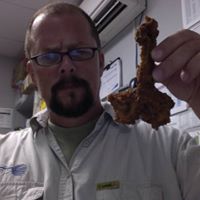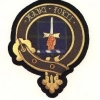Ok, let's clear some things up. Army medics are ALL trained at EMT-B in AIT (advanced individual training, the school for your job after basic). Passing national registry is a requirement of graduation, this has been the case for many years now. CEUs have always been available, but depending on the unit and deployment schedule, not a priority. In my case, my certification lapsed because I had to spend my available time in schools like airborne and air assault and prepping for deployment. However, as of 2007, maintaining CEUs is required for promotion, so people getting out should all have at least NREMT-B.
Depending on unit, mission etc, obtaining NREMT-P is possible and works great towards promotion points. In fact, for flight medics and warrant officers, it is required. Now, understand that, like the Navy, "medics" are all technically under an umbrella title of Healthcare Specialist, all starting at the same school with EMT-B and then specializing as straight field/combat medics, pharmacy techs, hospital medics (like CNA), xray, nutrition, etc. Some go on to LPN school. So training starts to vary drastically very quickly.
Field medics like myself are trained to start IVs, push meds, intubate, suture, etc, many paramedic hand-skills. The initial training of a field medic is 16 weeks, but could be up to 68 weeks for other sub-specialties. In that initial training, obviously there is not a lot of time to get deep into the medicine and why's of the skills being taught. The emphasis is on confidence, speed, accuracy and doing it all in a tactical environment. On the job training after this initial schooling and opportunities for more advanced training are where those aspects come in. As some have said, not all medics are created equal. So much varies on assignment/attachment, that unit's mission and leadership. A medic in a medical support battalion, say working in a clinic stateside and field hospital in theater, has a very different job from someone like me, attached to an infantry unit. Soldiers facing combat wounds become masters of trauma while others assist PAs and run daily sick call, becoming masters of general medicine and VD. As a former field medic of the purest form who has now been thru paramedic school, I can say that skill wise, I was beyond equivalent to civilian medics. Knowledge wise, there were definite holes in my base - don't see too many middle-aged cardiac patients or diabetics in combat. However, what I did know, I knew very very well and I did have a strong overall base. Also, my critical thinking skills, scene management, leadership ability, problem solving and overall confidence well surpassed my civilian classmates (as noted by my instructors, hospital staff and senior medics on internship). So, I wouldn't call any of my experience a disadvantage. And I have known a lot of Army flight medics and spec ops medics who are extremely well-educated, at least at the paramedic level. You definitely can't lump all of us who fall under the name "medic" together.
As far as medics having trouble getting jobs when they get out, depends on when that was. The newest medics will be the most prepared as far as civilian certification, with maintenance being required for promotion and CEUs part of routine training. (I had to re-take EMT-B before I could go to paramedic school, which was very frustrating and BORING.) Are they ready to jump right on an ambulance? I'd say, depends on their background specialty/assignment. In my opinion, probably the most easily transitioned would be the aid station medics. Though used to working with docs and PAs, they are pretty independent, used to having more equipment and working in an intense, face paced emergency atmosphere. Straight field medics (me) are used to working solo, sometimes in groups of 2-3, and carrying everything they need on their person. Very good at handling pressure and critical thought, but lots to get used to when it comes to broader diagnostic and treatment options. And while used to fast pace/high intensity, combat is a much much different atmosphere than any non-tactical civilian application. Once at the aid station, the major enemy threat is over. Overall though, probably the biggest advantage military medics, particularly those who work in combat environments, have - the ability to quickly adapt and absorb new information. It's a necessary skill for survival and we have it down.
CLS is Combat Life Saver, basically the MFRs of the Army. Medics train and certify combat soldiers to do splinting, wound management, basic airways and to start IVs so they can be extra hands on the ground. Pure hand-skills vs medical knowledge, but they're great to have around, the more the merrier. To say that Army medics are just CLS trained is not right (see my other post).
As for the AF, couldn't tell ya what gets yelled, lol, they don't have much in the way of field situations where it would matter. The closest relative to a combat medic would be Pararescue, they are all medically trained and badass. On base, there are Emergency Management techs who create and maintain disaster plans and various clinical techs in hospitals. The actual day-to-day emergency medical on an Air Force base is actually covered by civilian EMS.
http://www.airforce.com/careers/#health-and-medicine












